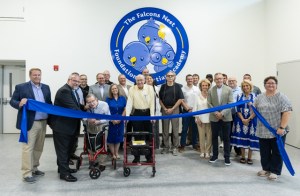Many in Kentucky choose not to get H1N1 vaccinations
Published 12:00 am Wednesday, January 13, 2010
An H1N1 vaccine availability survey released Tuesday by state health officials revealed that only 25 percent of adults in priority groups have received the vaccine.
Further, the survey showed that only 16 percent of adult Kentuckians who responded said they have been vaccinated, while 32 percent indicated that their child had been vaccinated.
Trending
For adults who wanted the vaccine but had not received it, the most common reason given by 19 percent of respondents was that it was not available.
Of those adults who wanted vaccines for their children but had not received it, 21 percent said it was not available, followed by 15 percent who indicated they did not know about it and 9 percent who were concerned about vaccine safety.
The survey findings indicate that many more Kentuckians still need to receive the H1N1 flu vaccine, according to Dr. William Hacker, commissioner of the state Department of Public Health. The survey was conducted in mid-December.
“While the survey captured a snapshot in time in mid-December, the number of Kentuckians who said they were not planning to be vaccinated is concerning,” Hacker said in an e-mail. “The more people who are protected against H1N1 flu, the less likely we are to see the flu spreading widely in our communities again this season. There is now enough swine flu vaccine in Kentucky for anyone who wishes to receive it, and we hope that people will take advantage of the opportunity to be vaccinated now. We urge people to contact their health care provider, an area pharmacy or their local health department to arrange vaccination.”
Gov. Steve Beshear on Tuesday joined Hacker in a call for stepped-up vaccination, proclaiming this week – Jan. 10-16 – National Influenza Vaccination Week in Kentucky. While the state has seen a decline in flu activity recently, another wave of swine flu is still possible in the months ahead, health officials have warned.
“Since the spread of 2009 H1N1 is likely to continue into the new year, this weeklong observation will be an important opportunity to promote the uptake of H1N1 flu vaccination at a time when demand for vaccine usually drops significantly,” Hacker said.
Trending
The survey also showed that of those who had not been vaccinated, less than 30 percent expressed interest in doing so. Of those who indicated they do not plan on being vaccinated, 30 percent said it was mainly due to not being concerned about getting sick from H1N1 while 20 percent said it was because of vaccine safety. Some 31 percent indicated they had not had their children vaccinated due to concerns over safety.
While flu is unpredictable, if more people are vaccinated, the disease is less likely to spread in the coming months, according to Hacker.
“I want to reassure Kentuckians that the swine flu vaccine is safe and effective, and was produced using the same methods as seasonal flu vaccine,” he said. “We especially urge those with chronic health conditions that put them at risk of serious flu-related complications to get vaccinated as soon as possible.”
H1N1 vaccine priority groups include pregnant women, women who are six weeks post-partum, people who live with or care for children younger than 6 months, health care and emergency service workers, children and young adults age 6 months to 24 years and adults age 25 to 64 years with chronic health conditions such as asthma, heart disease, weakened immune systems or kidney disorders.
The survey was used as a tool to measure the saturation of available H1N1 vaccine in communities across the state, specifically for the target groups identified as being at higher risk for developing complications from flu.
The survey was conducted by The Matrix Group in Lexington. Funding for the survey was provided through a federal grant from the Centers for Disease Control and Prevention.
Anyone interested in getting the vaccine in the Warren County area can contact the Barren River Health Department at 781-2490 and schedule an appointment. The health department has no mass clinics scheduled because there has been a decrease in vaccine demand, but officials are still encouraging the public to be vaccinated, said Crissy Rowland, health information branch manager. Anyone in outlying areas can contact their local health departments for vaccines as well, she added.







